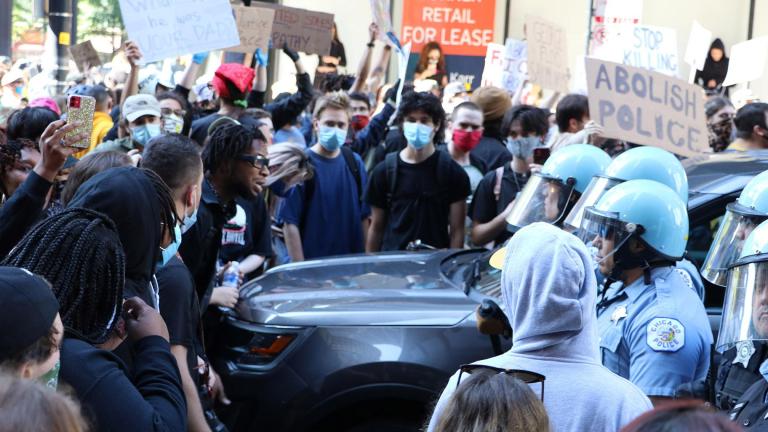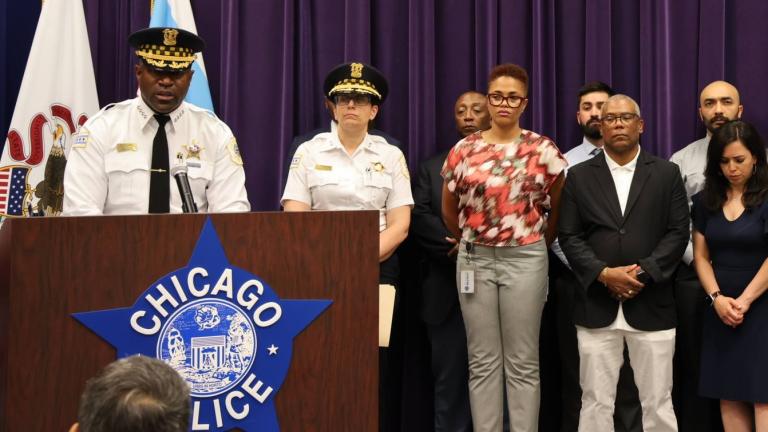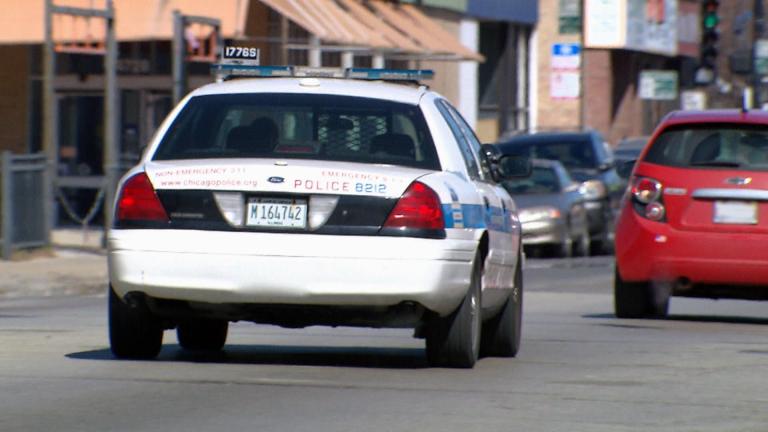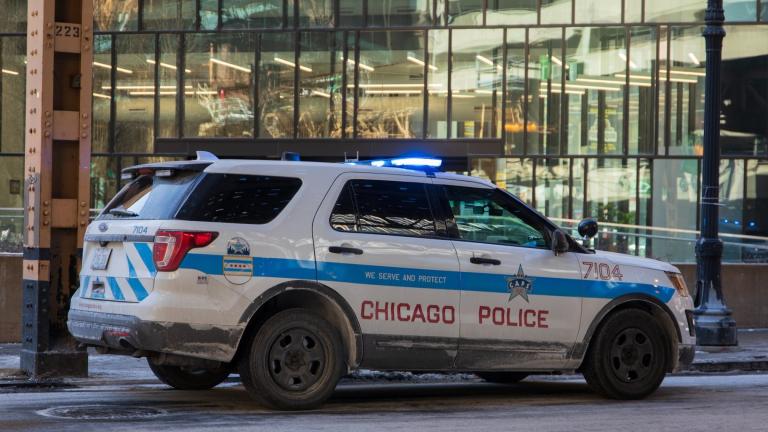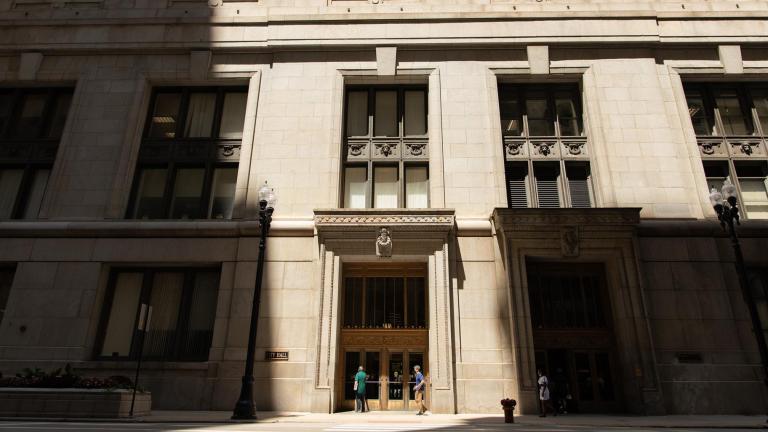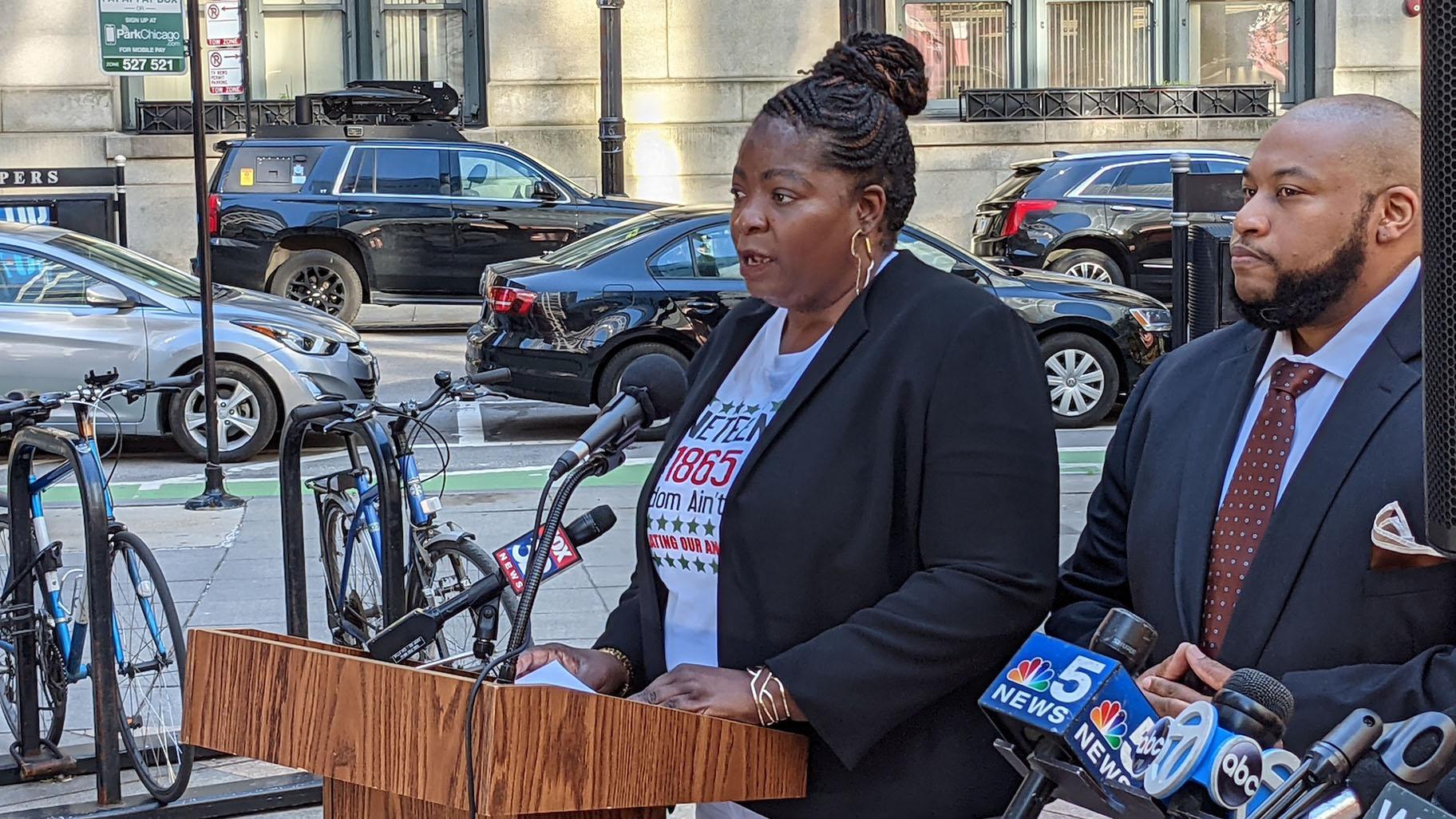 Anjanette Young and her attorney Keenan Saulter speak outside the James R. Thompson Center on June 16, 2021. (Matt Masterson / WTTW News)
Anjanette Young and her attorney Keenan Saulter speak outside the James R. Thompson Center on June 16, 2021. (Matt Masterson / WTTW News)
The federal judge overseeing efforts to reform the Chicago Police Department declined Wednesday to ban no-knock warrants or tighten restrictions on when – and how – officers can raid Chicagoans’ homes, according to a new ruling.
U.S. District Court Judge Rebecca Pallmeyer rejected nearly all of the demands made by the coalition of police reform groups behind the consent decree, the federal court order requiring CPD to change the way it trains, supervises and disciplines officers.
The coalition had asked the judge to also ban officers from executing warrants to search for evidence of minor offenses, to ban officers from pointing guns at people during raids and to require officers to wait for a minimum amount of time before making forced entry into a home or apartment.
Pallmeyer declined those requests, which city lawyers and police brass had also rejected.
However, the judge did order CPD to “clarify, in policy, that CPD personnel are responsible for weighing the anticipated benefits against the risks of each search warrant” as requested by the coalition.
Alexandra Block, the director of the criminal legal systems and policing project at the ACLU of Illinois, said the ruling was disappointing.
Block said the judge’s ruling would allow the City Council to ban no-knock warrants and tighten restrictions on how CPD officers serve warrants and urged alderpeople to do so quickly.
“The consent decree is not a cure all,” Block said.
Illinois Attorney General Kwame Raoul, who is charged with helping to enforce the consent decree, praised Pallmeyer’s “thoughtful approach and engagement on this complex issue.”
“While we advocated for a ban on no-knock warrants with limited exceptions as part of the consent decree process, police reform necessarily requires a broad-based approach that goes beyond the limits of the consent decree,” Raoul’s office said in a statement to WTTW News.
CPD’s use of search warrants has been in the spotlight since December 2020, when CBS2-TV aired video of officers raiding the home of Anjanette Young, a social worker who was handcuffed while naked during a botched raid in February 2019.
The video of officers ignoring Young’s pleas for help ignited a political firestorm that forced former Mayor Lori Lightfoot to revise the department’s search warrant policy to require bureau chiefs sign off on any no-knock warrants. The revised policy also added steps before, during and after the execution of a search warrant, such as requiring officers to account for the possible presence of children or vulnerable parties and mandating a lieutenant or higher-ranking official is on the scene.
Young told WTTW News late Wednesday she was reviewing the judge’s decision. Young has said she was deeply traumatized by the botched raid and was determined to ensure no one else suffers like she has. Chicago taxpayers paid $2.9 million to settle the lawsuit she filed against the city.
Pallmeyer’s decision ends a three-year process that began in January 2021 amid the outrage over the raid on Young’s home. The consent decree expanded in March 2022 to include the issue of search warrants, forcing city officials to get Pallmeyer to sign off on proposed changes to the city’s search warrant policy.
Along with Alds. Maria Hadden (49th Ward) and Pat Dowell (3rd Ward), Young believes the current policy does not do enough to protect Chicagoans from botched raids.
Hadden declined to comment late Wednesday, saying she was still reviewing the judge’s decision.
A City Council committee rejected a proposal backed by Young in November 2022 that would have banned no-knock warrants and restricted how Chicago police officers can raid homes.
During the 2023 mayoral election, Young endorsed Mayor Brandon Johnson, who vowed to “end no-knock warrants once and for all” in his campaign platform.
A spokesperson for Johnson declined to comment on Pallmeyer’s ruling.
In February, Johnson marked the fifth anniversary of the raid on Young’s apartment and said he was “honored to support Ms. Young as she continues her work to push for systemic changes, and my administration looks forward to continuing to partner with her in those efforts.”
The Chicago Police Department’s policy restricts no-knock warrants to situations in which “there is a reasonable suspicion that knocking and announcing would be dangerous to the life or safety of the officers serving the warrant or another person.”
A probe by the Civilian Office of Police Accountability found evidence that officers committed nearly 100 acts of misconduct during the botched raid of Young’s home.
An audit by city’s inspector general found that approximately 72% of all search warrants served by the Chicago Police Department in homes during the past four years targeted Black men.
A separate report by Inspector General Deborah Witzburg released in July found that the number of homes searched by Chicago Police officers dropped nearly 90% since 2019.
Only five warrants served in 2022 were so-called no-knock warrants, which allow officers to enter a home without first announcing their presence, according to the report.
A spokesperson for the Chicago Police Department has said officials work to ensure search warrants and other investigative tools are “used appropriately, fairly and constitutionally as part of our ongoing efforts to grow and maintain trust in the communities we serve.”
Contact Heather Cherone: @HeatherCherone | (773) 569-1863 | [email protected]

